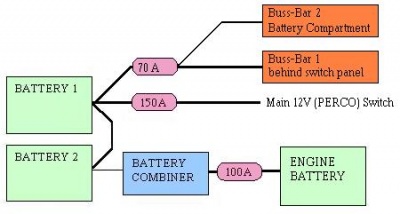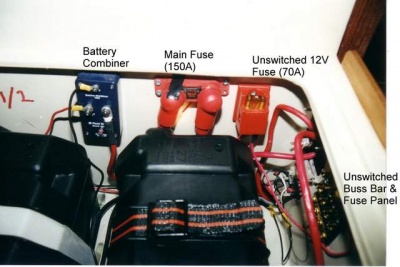Difference between revisions of "Unswitched 12V Power"
m |
Mark Elkin (talk | contribs) |
||
| (3 intermediate revisions by one other user not shown) | |||
| Line 1: | Line 1: | ||
| − | + | '''By Mark Elkin, ''[[Yorkshire Rose]]'' #133 ''' | |
| − | '''By Mark Elkin, ''Yorkshire Rose'' #133 ''' | ||
| Line 6: | Line 5: | ||
{| | {| | ||
| − | |[[image:rose-unswitched-12v.jpg| | + | |[[image:rose-unswitched-12v.jpg|400px]] |
| − | |[[image:rose-battery-box-annot.jpg| | + | |[[image:rose-battery-box-annot.jpg|400px]] |
|} | |} | ||
Latest revision as of 09:20, 17 October 2011
By Mark Elkin, Yorkshire Rose #133
The previous owner just ran a small wire with a BIG ring lug to the battery terminal to get unswitched 12V power. After making other battery power upgrades, I decided to "do it right." I've added heavy gage wire (#8) from the battery to a 70A fuse right in the battery box. From the "output" side of the fuse, I put a combination buss-bar & fuse panel for the unswitched 12V loads (bilge pump, bilge high water alarm, and battery monitor power), each with an appropriately sized traditional fuse. I also ran another #8 wire from the 70A fuse "output" along side the switched main power cables from the battery compartment to another buss-bar & fuse panel positioned behind the main electrical switch panel. And again, any power from that panel passes through an appropriately sized traditional fuse.

|

|